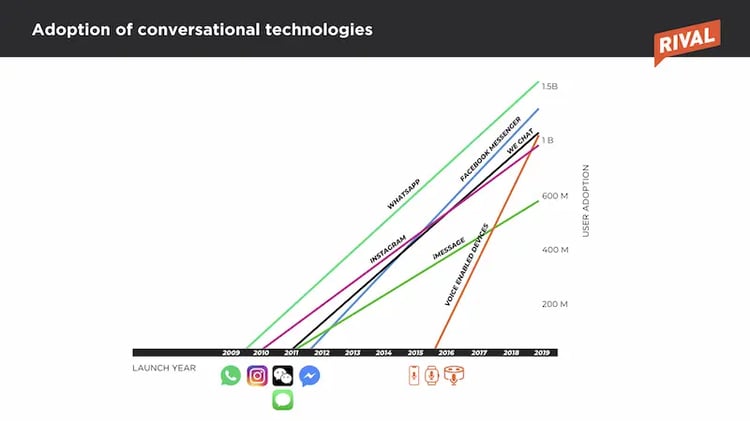
If a recent headline on the CNBC website is right, the next five years could see the end of the keyboard. The article quotes Mark Tluszcz, co-founder and CEO of Mangrove Capital Partners, who made the bold prediction that as an “input device,” the keyboard is about to see a massive decline.
The reason for the keyboard’s impending death, according to Tluszcz? Voice technologies. The venture capitalist thinks voice-enabled technologies represent a “massive change” in the business landscape and that many companies will soon be shifting their strategy to focus on this new trend.
“Voice is the opportunity of a decade,” Tluszcz tells CNBC. “There are going to be many companies built that are only voice.”
Tluszcz’s prediction may be attention-grabbing, but how close is it to reality? More importantly, if he is right, what does the rise of voice technologies mean for the market research industry?
Voice technologies encompass a growing market that includes voice assistants, smart speakers and other similar technologies. Tech giants like Amazon (with its smart speaker, Echo, and voice assistant, Alexa), Google (Google Assistant and Google Home), and Apple (Siri) are some of the biggest players in this space.
The data on user adoption of voice technologies show a market that’s rapidly growing:
✓ In the US, there are now 74.2 million smart speaker devices, according to emarketer. In China, that number is even higher: 85.5 million.
✓Another report, from Voicebot.ai and Voicify, claims that over a quarter of US adults already own a smart speaker.
✓By 2023, there will be 8 billion digital voice assistants in use, predicts a 2018 study from Juniper Research.
As a result of this massive and quick user adoption, many companies are now investing resources to figure out how voice technologies fit into their business.

Research from Salesforce suggests that 32% of marketing organizations are already using voice-activated assistants to support the customer experience. Almost 30% of marketers are pursuing voice as a strategy.
“Voice is the opportunity of a decade."
Adobe found in a recent study that 91% of businesses are creating their own voice apps or building solutions that integrate with Amazon’s and Google’s smart speaker and assistant ecosystem. Interestingly, successful companies are more likely to prioritize voice. According to Adobe, 82% of companies that are outperforming their competitors recognize that voice-enabled experiences are very important.
Experimentation in voice tech is happening in a wide range of industries, including hospitality, publishing, banking and automotive. “It won’t be long before every company will be expected to own and manage its own voice-first presence and capabilities,” writes Bradley Metrock, CEO of Score Publishing on Harvard Business Review. “What matters right now is for companies to test voice-first technology for themselves and begin to learn what works for their business and what doesn’t.”
The stats above clearly show that consumers are quickly adopting voice technology as a way to do their day-to-day tasks. More than a trend, voice technologies represent a big opportunity for the market research industry to engage with consumers.
Some potential benefits for insights include:
In-the-moment feedback
Imagine being able to capture insights from consumers while they are participating in the topic you are researching. For instance, while making dinner, people could take a quick voice survey to share their thoughts on new food or dining trends.
Rich, qualitative insights
Voice technologies could allow market researchers to (literally) hear the voice of the customer. Voice enables one-to-one interviews without the complexity and big cost of recruiting and moderating an in-person focus group. Voice also opens the opportunity to conduct word association activities, open-ended probing and other qual-based research methodologies.
Accessibility
Voice enables engagement with people who are often excluded from traditional surveys: people with disabilities. Using voice assistants, people who may not be able to see or type can answer questions and provide their thoughts and feedback.
Beyond its practical applications, the most interesting thing about voice is its potential to make research more conversational — and get more candid, richer feedback as a result.
“Those of us thinking about the future of surveys and the future of research more broadly need to think beyond the immediate, practical applications and to how we connect with people to participate in research in an increasingly voice-driven world,” Roddy Knowles, Director of Product & Innovation Research from Dynata, recently wrote for the Insights Association blog. “With persistent talk about the ‘voice of the customer,’ let’s think more about how we actually hear their voices.”
Subscribe to our blog to receive the latest news, trends and best practices from market research experts.


No Comments Yet
Let us know what you think